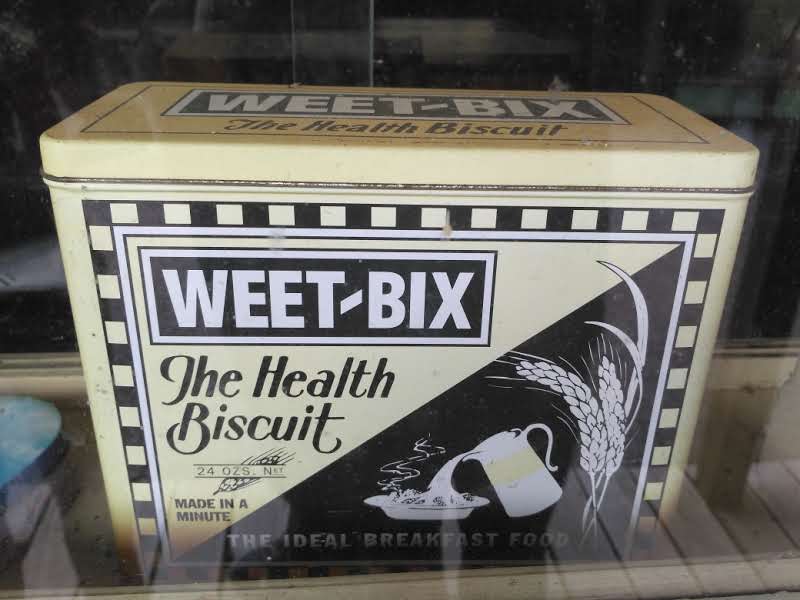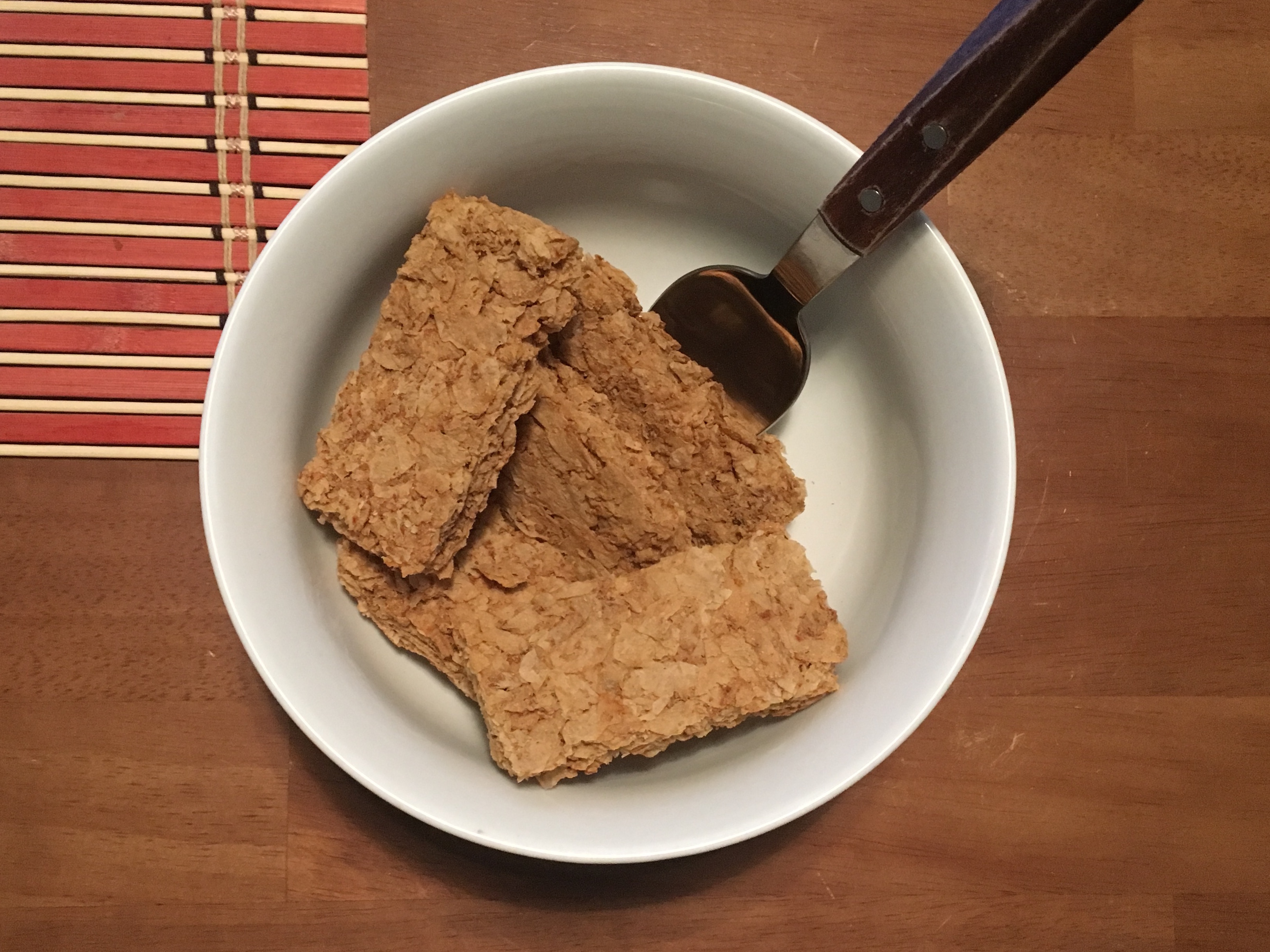Weet-bix on:
[Wikipedia]
[Google]
[Amazon]
Weet-Bix is a whole-grain wheat
 Weet-Bix was developed by Bennison Osborne in
Weet-Bix was developed by Bennison Osborne in  While in South Africa, Osborne and Macfarlane sought to obtain more satisfactory financial backing to secure Osborne's product. A group was formed, Osborne refined the product and he and Macfarlane went to England to form the British & African Cereal Company, Ltd., which they registered in London in 1932,
While in South Africa, Osborne and Macfarlane sought to obtain more satisfactory financial backing to secure Osborne's product. A group was formed, Osborne refined the product and he and Macfarlane went to England to form the British & African Cereal Company, Ltd., which they registered in London in 1932,
Company No. 00267687 as a Private Company, with the proprietor shown as Weetabix Limited of Weetabix Mills, Burton Latimer, Kettering. All shares in the company were specified to be under the control of the Directors, the first of whom were Bennison Osborne, Malcolm Ian Macfarlane, Alfred Richard Upton and Arthur Stanley Scrutton. For the purpose of differentiating the product from that sold in Australia, New Zealand and South Africa, the product was named " Weetabix". Osborne and Macfarlane became the joint managing directors with Osborne controlling production and Macfarlane controlling marketing. Sites for the factory were examined, with Burton Latimer in
Retrieved 17 June 2015 Earlier in 2014, the company had recommissioned their
 Weet-Bix is seen in Australia, New Zealand and South Africa as an iconic national foodstuff. An online poll of 16,000 people in 2006 identified it as Australia's favourite trademark. The product has been marketed in Australia since 1985 with the catchphrase "Aussie Kids are Weet-Bix kids". Based on its success in Australia, a similar catchphrase was adopted six months later in New Zealand: "Kiwi Kids are Weet-Bix kids".
Weet-Bix is seen in Australia, New Zealand and South Africa as an iconic national foodstuff. An online poll of 16,000 people in 2006 identified it as Australia's favourite trademark. The product has been marketed in Australia since 1985 with the catchphrase "Aussie Kids are Weet-Bix kids". Based on its success in Australia, a similar catchphrase was adopted six months later in New Zealand: "Kiwi Kids are Weet-Bix kids".
Weet-Bix Australia
Australian cuisine New Zealand cuisine South African cuisine Sanitarium Health and Wellbeing Company brands
breakfast cereal
Cereal, formally termed breakfast cereal (and further categorized as cold cereal or warm cereal), is a traditional breakfast food made from processed cereal grains. It is traditionally eaten as part of breakfast, or a snack food, primarily in We ...
created and manufactured in Australia
Australia, officially the Commonwealth of Australia, is a sovereign country comprising the mainland of the Australian continent, the island of Tasmania, and numerous smaller islands. With an area of , Australia is the largest country by ...
and New Zealand
New Zealand ( mi, Aotearoa ) is an island country in the southwestern Pacific Ocean. It consists of two main landmasses—the North Island () and the South Island ()—and over 700 smaller islands. It is the sixth-largest island coun ...
by the Sanitarium Health Food Company, and in South Africa
South Africa, officially the Republic of South Africa (RSA), is the southernmost country in Africa. It is bounded to the south by of coastline that stretch along the South Atlantic and Indian Oceans; to the north by the neighbouring coun ...
by Bokomo
Bokomo Foods ("The Goodness of Home") is the largest breakfast cereal company in South Africa, and is a division of Pioneer Foods (Pty) Ltd.
History
Bokomo Foods (Bolandse Kooperatiewe Molenaars) started as a wheat co-operative about 80 yea ...
.
History
 Weet-Bix was developed by Bennison Osborne in
Weet-Bix was developed by Bennison Osborne in Sydney, Australia
Sydney ( ) is the capital city of the States and territories of Australia, state of New South Wales, and the most populous city in both Australia and List of cities in Oceania by population, Oceania. Located on Australia's east coast, the metro ...
in the mid-1920s. Osborne set out to make a product more palatable than Granose, a biscuit that was marketed by the Sanitarium Health Food Company at that time. On 19 August 1926, he lodged an application for registration of the trademark Weet-Bix, a name which he had devised.
Production began at 659 Parramatta Road, Leichhardt, under the management of Osborne and with the financial backing of Arthur Shannon, who created the company "Grain Products" to manufacture the cereal. Osborne's friend Malcolm Ian Macfarlane from New Zealand joined him to take on a marketing role. The product was so successful that in October 1928, Shannon sold the rights in the product to the Australasian Conference Association Limited (Sanitarium Health Food Company, a wholly owned subsidiary and venture of the Seventh-day Adventist Church
The Seventh-day Adventist Church is an Adventist Protestant Christian denomination which is distinguished by its observance of Saturday, the seventh day of the week in the Christian (Gregorian) and the Hebrew calendar, as the Sabbath, and ...
in Australia). Macfarlane suggested that they ship the product to New Zealand, where it proved so successful that it became difficult to adequately supply the market from Australia. Osborne and MacFarlane went to New Zealand and factories were established in Auckland and Christchurch. However, once again, Shannon sold out to the Australasian Conference Association Limited.
Osborne and Macfarlane then exported the product to South Africa and with Shannon's financial backing, went to that country and a factory was built in Cape Town, with Osborne managing sales. This enterprise was also subsequently sold, this time to Bokomo
Bokomo Foods ("The Goodness of Home") is the largest breakfast cereal company in South Africa, and is a division of Pioneer Foods (Pty) Ltd.
History
Bokomo Foods (Bolandse Kooperatiewe Molenaars) started as a wheat co-operative about 80 yea ...
. While in South Africa, Osborne and Macfarlane sought to obtain more satisfactory financial backing to secure Osborne's product. A group was formed, Osborne refined the product and he and Macfarlane went to England to form the British & African Cereal Company, Ltd., which they registered in London in 1932,
While in South Africa, Osborne and Macfarlane sought to obtain more satisfactory financial backing to secure Osborne's product. A group was formed, Osborne refined the product and he and Macfarlane went to England to form the British & African Cereal Company, Ltd., which they registered in London in 1932,Company No. 00267687 as a Private Company, with the proprietor shown as Weetabix Limited of Weetabix Mills, Burton Latimer, Kettering. All shares in the company were specified to be under the control of the Directors, the first of whom were Bennison Osborne, Malcolm Ian Macfarlane, Alfred Richard Upton and Arthur Stanley Scrutton. For the purpose of differentiating the product from that sold in Australia, New Zealand and South Africa, the product was named " Weetabix". Osborne and Macfarlane became the joint managing directors with Osborne controlling production and Macfarlane controlling marketing. Sites for the factory were examined, with Burton Latimer in
Northamptonshire
Northamptonshire (; abbreviated Northants.) is a county in the East Midlands of England. In 2015, it had a population of 723,000. The county is administered by
two unitary authorities: North Northamptonshire and West Northamptonshire. It ...
eventually being chosen, due in part to the offer of a disused flour mill by a Mr. George, who requested shares in the company and who was subsequently offered a seat on the existing board of directors. In 1933, Macfarlane left the company to pursue other business interests, leaving Osborne as the sole managing director. George eventually became chairman of the board. Osborne sold his shareholding to the directors in July 1936, at which time the company was renamed "Weetabix Limited".
Osborne proceeded at that time to the United States, establishing a Weetabix factory in Clinton, Massachusetts. However, the venture was unsuccessful. Weetabix eventually entered the US market from Canada via Clinton, Massachusetts, the site of the original US factory.
Gluten Free Weet-Bix
In July 2014 Sanitarium introduced Gluten Free Weet-Bix, produced fromsorghum
''Sorghum'' () is a genus of about 25 species of flowering plants in the grass family (Poaceae). Some of these species are grown as cereals for human consumption and some in pastures for animals. One species is grown for grain, while many other ...
grains.''Introducing Gluten Free Weet-Bix'', www.sanitarium.com.au, July 2014Retrieved 17 June 2015 Earlier in 2014, the company had recommissioned their
Perth
Perth is the capital and largest city of the Australian state of Western Australia. It is the fourth most populous city in Australia and Oceania, with a population of 2.1 million (80% of the state) living in Greater Perth in 2020. Perth is ...
-based Weet-Bix factory into a dedicated gluten free manufacturing facility to produce this new product.
Brand popularity
 Weet-Bix is seen in Australia, New Zealand and South Africa as an iconic national foodstuff. An online poll of 16,000 people in 2006 identified it as Australia's favourite trademark. The product has been marketed in Australia since 1985 with the catchphrase "Aussie Kids are Weet-Bix kids". Based on its success in Australia, a similar catchphrase was adopted six months later in New Zealand: "Kiwi Kids are Weet-Bix kids".
Weet-Bix is seen in Australia, New Zealand and South Africa as an iconic national foodstuff. An online poll of 16,000 people in 2006 identified it as Australia's favourite trademark. The product has been marketed in Australia since 1985 with the catchphrase "Aussie Kids are Weet-Bix kids". Based on its success in Australia, a similar catchphrase was adopted six months later in New Zealand: "Kiwi Kids are Weet-Bix kids".
Weet-Bix cards
Sanitarium started to issue collectors' cards in 1942 as a marketing device in their boxes of Weet-Bix and some of their other breakfast cereal products including Granose, Bixies, Cerix and later Puffed Wheat, Puffed Rice, Weeta Puffs, Weeta Flakes and Corn Flakes. Sanitarium have also issued cards in their New Zealand products, sometimes similar to the Australian series but also series with a New Zealand focus such as the All Blacks themed 'Stat Attack' cards.See also
*Weet-Bix cards
Weet-Bix is a whole-grain wheat breakfast cereal created and manufactured in Australia and New Zealand by the Sanitarium Health Food Company, and in South Africa by Bokomo.
History
Weet-Bix was developed by Bennison Osborne in Sydney, Aus ...
– a list of Weet-Bix collector cards
* Weetabix – the UK variant that is now exported to around 80 countries.
* Shredded Wheat – another wheat-based biscuit cereal.
* Granola
References
{{reflistExternal links
Weet-Bix Australia
Australian cuisine New Zealand cuisine South African cuisine Sanitarium Health and Wellbeing Company brands